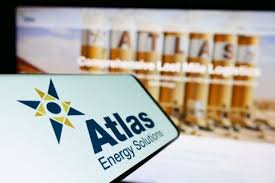A Nigerian clean energy infrastructure firm, Atlas Core Energy and Logistics, has unveiled a new initiative aimed at transforming the country’s transport and logistics sector. The company has officially launched its Fleet Conversion and Clean Mobility Strategy, targeting major logistics corridors and high-traffic urban areas across the country.
In a statement released on Wednesday, the Chief Executive Officer of Atlas Core Energy and Logistics, Mr Owoade Emmanuel, said the plan is to support Nigerian fleet operators in moving away from fossil fuels to cleaner energy alternatives like compressed natural gas (CNG), electric vehicles, and hybrid engines.
Owoade Emmanuel, who is a UK-trained researcher and energy strategist, said the initiative will help cut down Nigeria’s heavy reliance on petroleum-based fuels, which currently dominate the country’s transport sector. He explained that the programme will roll out CNG conversion hubs and service centres along strategic routes, with a focus on corridors used by logistics operators, commercial transporters, and mass transit vehicles.
He noted that the strategy is designed to support the gradual transition to clean energy in a way that is both economically viable and technologically sound. He added that Atlas Core will work with logistics companies, fleet owners, and urban transport agencies to ensure that the shift to cleaner fuel options is not only affordable but also improves operational efficiency.
“The time for slogans is over; it’s time to build the systems that power change. Nigeria’s logistics and energy sectors are intertwined, and if we’re serious about sustainability, we must drive infrastructure that supports this shift,” Emmanuel stated.
He explained that the firm is focusing on providing practical solutions by setting up the required facilities such as conversion centres, service stations, and supply chains that will support the use of CNG, electric, and hybrid vehicles. According to him, this infrastructure will be developed across key states, including Lagos, Abuja, Kano, Rivers, and Ogun, which are known to be major logistics and transport centres.
He also revealed that the company is already engaging with stakeholders in the transportation, energy, and government sectors to design policies that support the mass adoption of clean fuel technologies. Emmanuel said the company’s goal is to become a key player in the development of Nigeria’s clean energy ecosystem, helping the country reduce greenhouse gas emissions, cut fuel import bills, and create jobs in new energy sectors.
As part of the programme, Atlas Core plans to create local partnerships with firms that already manage large vehicle fleets, including courier services, e-commerce delivery companies, inter-city bus lines, and ride-hailing platforms. By working closely with these businesses, Atlas Core hopes to test and scale clean mobility options that are practical, profitable, and well-suited to Nigerian road conditions.
He added that the firm is also investing in research and development to support the localisation of technologies, especially in the area of CNG conversion kits and battery systems for electric vehicles. The aim, he said, is to ensure that Nigerian businesses are not left behind as the global transition to clean energy accelerates.
The Fleet Conversion and Clean Mobility Strategy will also explore opportunities to partner with state governments and federal agencies such as the Nigerian Midstream and Downstream Petroleum Regulatory Authority (NMDPRA), the National Automotive Design and Development Council (NADDC), and the Nigerian Investment Promotion Commission (NIPC).
Owoade Emmanuel said the company’s mission is not just to join the global conversation about climate change, but to lead efforts in Nigeria by building the infrastructure that makes real change possible. He said this includes investing in training programmes for mechanics, transport technicians, and drivers to ensure a smooth and safe transition.
Atlas Core Energy and Logistics joins a growing list of Nigerian firms tapping into the country’s clean energy push, especially with rising diesel and petrol prices, foreign exchange pressures, and global moves to limit carbon emissions. The firm’s new initiative is expected to support the federal government’s goal of achieving net-zero emissions by 2060.
Industry analysts have described the plan as timely and critical for Nigeria’s long-term energy security and environmental sustainability, particularly given the increasing challenges facing the transport and logistics sectors.
